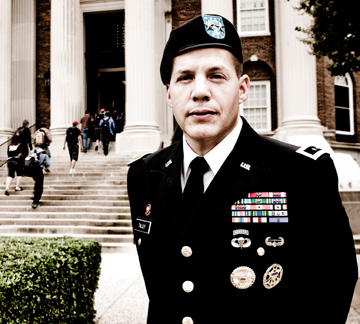The seduction continued at another luxe eatery, Stephan Pyles, where the meal was prepared by Pyles himself, a coup the aspirational Orsak is glowingly proud of (“best ceviche I’ve ever had in Dallas”) but one utterly lost on Talley, an unapologetic Arby’s guy. At the dinner were Orsak and Lyle, but this time they brought the special ops team: Mitch Hart, the Dallas-based Home Depot magnate, and his highly connected attorney wife Linda; Bob Zollars, DART system mastermind and CEO of the industrial design giant Huitt-Zollars; and Karen Shuford, a philanthropist and inductee in SMU’s Hall of Engineering Leaders. As Talley remembers it, miscalculating by a hundred million here or there, “a who’s who in America of business, every one of them, I think, a billionaire.”
“The purpose of this group,” Talley recalls Orsak saying, “is simply to convince you and Linda to come to Dallas.” Soon after, Lyle raised a toast to the then one-star brigadier general. The astonished recollection is Talley’s:
Lyle: “The first thing we want to do is celebrate your promotion.”
Talley: “Dr. Lyle, Linda and I have not yet decided to come here, so I think it’s premature.”
Lyle: “I don’t mean SMU. We understand that you’re on the two-star list, and you should be hearing from the Pentagon any day now. So we want to be the first ones to celebrate your promotion to major general.”
Talley: “Sir, how do you know that? Yes, the list has been decided and the president is nominating the candidates for two-star to the Senate for confirmation. But that list is very close-hold. I certainly have not seen it. I have been told unofficially there’s a likelihood my name will be on it. But it won’t be released, sir, until next Monday.”
Lyle: “Well, we have it on reliable sources that your name will be on the list, and we want to be the first to celebrate. Is that okay?”
At meal’s end, Talley remembers Lyle, again, taking command: “‘Son,’ he said, ‘we understand you haven’t made a decision yet, but we’ve got a lot of resources at this table.’ And with that he pulls out a pen, kinda like a checkbook, implying, Well, what exactly has SMU not offered you that we around this table might be able to help with? ‘Dr. Lyle,’ I said, ‘this isn’t about resources. This is about loyalty. You’re asking an Irish Catholic to leave Notre Dame, and when you do that, God gets involved. From everybody else’s foxhole, this may seem like a slam-dunk, but it’s not about resources; it’s about loyalty.’ ‘Well,’ he said to me, ‘isn’t the God at SMU the same God at Notre Dame?’ ‘It is the same God,’ I said. ‘That’s why I’m gonna think about it.’”
When Talley finally said yes—an announcement he made the following night at Orsak’s Lake Forest home—the reaction in South Bend was swift and incredulous. “This is Notre Dame,” Talley recalls Kilpatrick telling him. “We cannot be outbid by anyone.”
Text messages from distressed colleagues began pouring in: “You’ll have to convert to Methodist. Don’t do it!”
Kilpatrick made impassioned and protracted pleas, blaming himself for the inability to envision a larger role for his major general and, according to Talley, insisting again that what SMU had to offer was beer money compared to Notre Dame’s fat endowment.
Talley and Orsak are strenuously discreet in regard to the size of the Hunt family outlay for Talley’s new institute. Not Kilpatrick. “Twenty-six million,” he says. “We’ve got a lot of endowments at Notre Dame, but we don’t have a donor with that amount of capital to invest in that kind of an initiative. I wish we did. We could have kept him.”
Talley’s decision, though heartrending, was definitive. “I love Notre Dame. I love Notre Dame,” he told Kilpatrick. “But when you put it all together, this opportunity seems too unique; probably, once in a lifetime. I’ve got to believe that, for reasons I can’t explain, God wanted me to leave Notre Dame for a Protestant school in Texas. What can I say? He’s got a sense of humor.”
===You’re asking an Irish Catholic to leave Notre Dame, and when you do that, God gets involved.!==
“I have never been motivated by rank or money,” Talley says in mid-September, just two weeks into his new life in Dallas.
“I can guarantee you that,” says his wife Linda, whose warmth and winning lack of pretension are right there in the spread of chips and Sam Adams she’s laid out in their still barely furnished off-campus bungalow, an SMU property the couple will call home in their transition year. Any money Talley has ever earned, she says, has gone to their kids, the youngest of whom is now 20. After a lifetime of driving heaps, the Talleys—with hesitation, a measure of embarrassment, and more than a little glee—just bought a preowned Lexus Hybrid SUV. It’s a gift to Linda, Talley says, for being the glue of his family through wars and so many uprootings.
Naturally, Talley has hit the ground running and, without apology, already put a jolt into his department of environmental and civil engineers. At the very first meeting with his staff of teaching and lecturing profs, the major general laid out his expectation that his troops will rapidly transition from an entrenched teaching fleet into a world-class teaching and research force, one that will publish its findings regularly and will see the world, not just the leafy quads of SMU, as its campus.
“I am here,” he said, “to afflict the comfortable and to comfort the afflicted.” He’s prepared for their return fire—as long as it’s respectful. “Come in my office and pee on my Cheerios every day. I’m good with that,” Talley says. “But don’t pee on me. Don’t disrespect me. I probably deserve everything I get, so bring it on.”
Talley will enjoy the full support of Orsak, who is braced for the grumbling, some of which he’s already heard: “Whoa, man, take the foot off the accelerator. You’re scarin’ us! I’ve certainly heard people say, ‘This is a completely different type of animal than we’ve seen before.’ And all I can say is, ‘You’re right! Why do you think we brought him here?’”
Less clear is Talley’s charge vis-à-vis his Caruth Hall-based institute, the name of which Orsak, of course, declines to reveal prematurely for fear of unsettling his donors.
“The Institute for Engineering and Humanity,” crows Talley. “It should be the Stephanie and Hunter Hunt Institute for Engineering and Humanity. That’s what I think.”
It’s a sexy concept, this notion of saving the planet from behind a CVS on Mockingbird Lane. But what will it mean for Dallas, which, occasional outbreaks of gangbanging and sewage backup notwithstanding, isn’t Sadr City? In terms of innovation and infrastructure, are we talking about free cable in every household south and east of Village Burger Bar?
“Well,” says Orsak, regarding the city’s neediest, “if they all want cable, and we can make cable possible for $30 a month, and that’s gonna change that community, why not? But that’s not what they’re going to say they want. They’re going say they want parks their kids can play in and houses that aren’t crack houses. They’ll want blight removed where blight exists and transportation that gives them access to one of the great metropolitan cities in the world. All these things we have attempted [and failed] to solve through public policy. Now we can try something different, the thing that has been most durable in this country: innovation.”
If that sounds like just more cozy Green Zone talk, Talley, at least, is happy to strap on his brain bucket and live outside the wire. This is, after all, the guy who had the gumption to preach his thesis about counterinsurgency to the mighty Gen. David Petraeus himself, as they toured the streets of Sadr City on Talley’s lone extended encounter with his four-star superior. There is an important and direct relationship, Talley told Petraeus, between quality-of-life-restoring engineering efforts and the shutting down of violence in war-ravaged regions. Talley’s thoroughly considered and researched conclusion: “Failed diplomacy is what war is.”
“Be careful, General Talley, about your use of cause and effect,” Petraeus cautioned.
“Sir,” Talley replied, “I didn’t say ‘cause and effect.’ I’m an academic. I was very careful with my words. I said there’s a relationship.”
“Well,” Petraeus huffed, “I do know something about this counterinsurgency stuff.”
To which Talley responded with a completely inappropriate exuberance that might be the best of his extraordinarily bright qualities: “I acknowledge that, sir, but I’m not stupid, either. I’m not one of those liberal arts guys, like you. I’m an engineer!”
John McAlley is a contributing editor at NPR.org.






